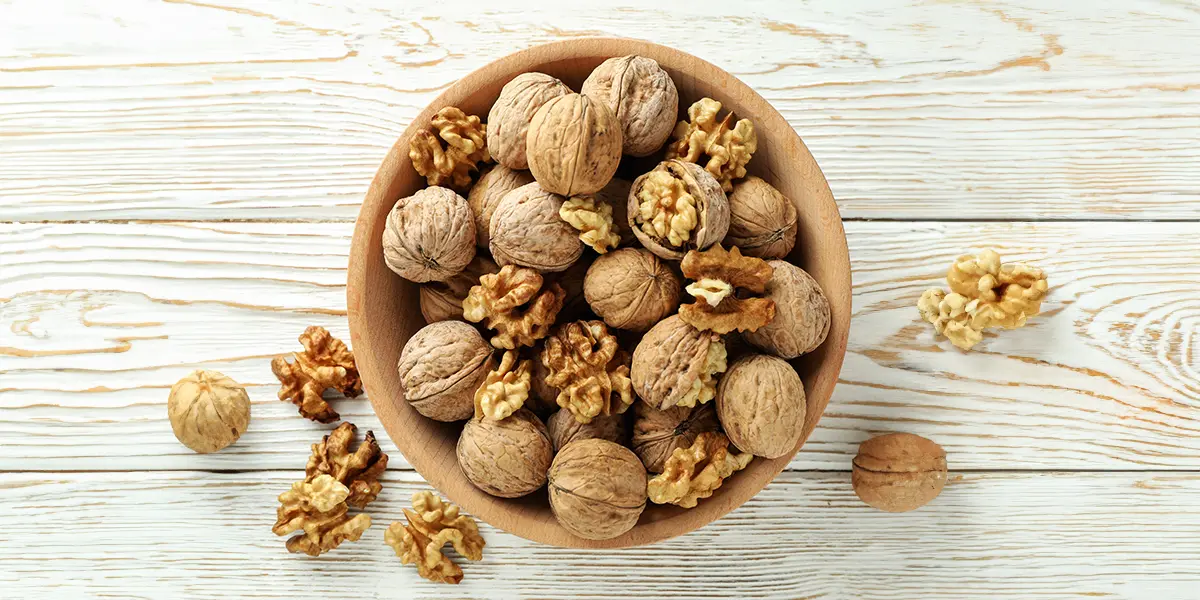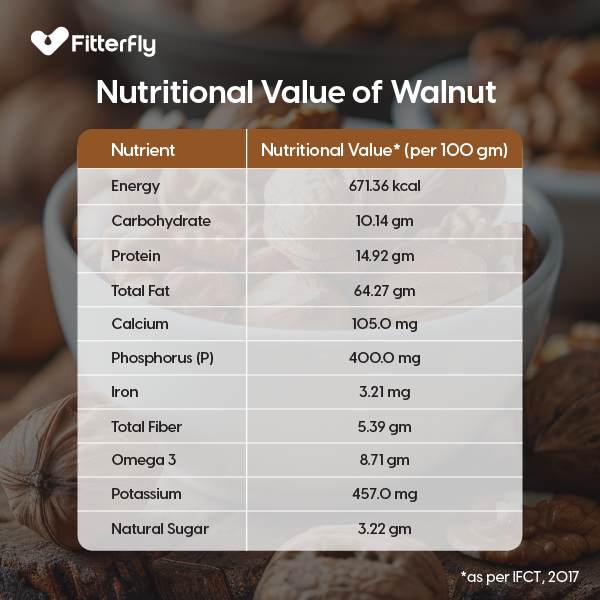Is Walnut Good for Diabetes?

Walnuts are loved by many for their rich taste and crunch. People enjoy them in different ways, like eating them on their own, mixing them into creamy walnut ice cream or kulfi, or baking them into delicious walnut cakes.
This nut adds a special touch to any treat, making it a favorite in kitchens everywhere.
But beyond their delicious flavor, walnuts are also packed with nutrients that can benefit your health, especially if you have diabetes. In this blog, we’ll explore whether walnuts is good for diabetes and how they can fit into a diabetes-friendly diet.
So, are walnuts good for diabetes? Read on to find out the answers!
What are Walnuts?
Walnuts, also known as akhrot, are a powerhouse of nutrients. Walnuts contain healthy fats, particularly omega-3 fatty acids, known for their anti-inflammatory properties.
They are also a good source of protein, fiber, vitamins, and minerals, including magnesium and vitamin E. This nutrient-dense profile makes walnuts a great addition to a balanced diet.
To know your chances of Diabetes reversal, take the Diabetes Reversal TestDiabetes Reversal
Calculator
What is the Nutritional Value of Walnuts?
The nutritional value of walnuts is impressive. They contain healthy fats, protein, and essential vitamins and minerals. This makes them not only a delicious snack but also a highly nutritious one.

What is the Glycemic Index of Walnuts?
The glycemic index of walnuts is low, so they do not cause a rapid spike in your blood sugar levels. Adding walnuts to your diet can help stabilize blood sugar levels, which is important for people with diabetes.
What are the Benefits of Walnuts for Diabetes Management?
1. Blood Sugar Control
Is walnuts good for diabetes? Yes, because they have a low glycemic index, helping to stabilize blood sugar levels.
2. Heart Health
Diabetes significantly increases the risk of heart disease. Walnuts are heart-friendly as they contain a high amount of omega-3 fatty acids and antioxidants.
These nutrients help reduce inflammation and improve heart health, thereby mitigating one of the major complications associated with diabetes.
3. Weight Management
Maintaining a healthy weight is essential for managing diabetes. The healthy fats and fiber in walnuts promote a feeling of fullness, which can help control appetite and prevent overeating, leading to better weight management and improved blood sugar control.
4. Improved Insulin Sensitivity
Studies have shown that regular consumption of walnuts can improve insulin sensitivity. This means the body becomes more efficient at using insulin to lower blood sugar levels, which is particularly beneficial for people with type 2 diabetes.
5. Antioxidant Properties
Are there any benefits of eating walnuts in diabetes? Yes, walnuts are rich in antioxidants, which help protect your cells from damage caused by harmful molecules.
This can be especially helpful for people with diabetes by reducing the risk of complications.
What are the Risks of Eating Walnut in Diabetes?
While walnuts are generally safe, they are high in calories. Consuming them in large quantities can cause weight gain, which can adversely affect diabetes management. Therefore, moderation is key.
What are the Ways to Incorporate Walnuts into the Diet?
Adding walnuts into your diet is easy and versatile. Here are some simple ways and walnut recipes for people with diabetes to enjoy them:
1. Snack Time: Enjoy a handful of raw or roasted walnuts as a snack.
2. Breakfast Boost: Add chopped walnuts to your daliya or dahi.
3. Salad Toppers: Sprinkle walnuts on your salads for an added crunch and nutritional boost.
How Many Walnuts Should People with Diabetes Eat Daily?
Regardless of diabetes, it’s recommended to consume a handful (28-56 grams) of nuts daily, which can include some walnuts. This amount provides health benefits without adding too many calories. Moderation is key.
How We At Fitterfly Can Help You?
Walnuts are not just a delicious and versatile nut; they are also a superfood for managing diabetes. Their ability to control blood sugar, improve heart health, aid in weight management, and enhance insulin sensitivity makes them an excellent choice for people with diabetes.
Our nutrition experts always recommend including healthy fats in your diet, and nuts are one of the best options. Among them, walnuts are a favorite for many.
At Fitterfly, our Diabetes Prime program is designed to help you make informed choices about your diet, exercise, and mental wellness, ensuring you manage your diabetes effectively.
Our experts work closely with you to create a personalized plan that includes nutritious foods like walnuts, tailored exercise routines, and mental wellness strategies, all designed to meet your unique needs.
If you want to learn more about our Diabetes Prime Program, just give us a missed call at 08068507599, and one of our program advisors will get back to you to better understand your health condition.
REVERSED Diabetes in 3 months


5.7%
Happy members
EMI
Guarantee
4.8/5
Diabetes Prime Program
This blog provides general information for educational and informational purposes only and shouldn't be seen as professional advice.
Frequently Asked Questions
Can walnuts raise blood sugar?
No, due to their low glycemic index, and low carb content, walnuts do not raise blood sugar levels.
Do walnuts have a lot of sugar?
No, walnuts are low in sugar and are a healthy option for those managing diabetes.




















